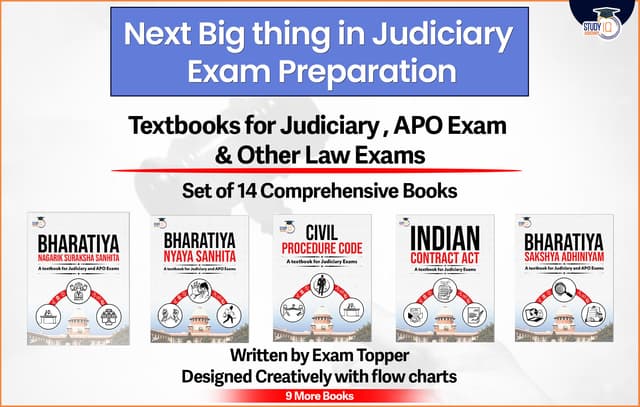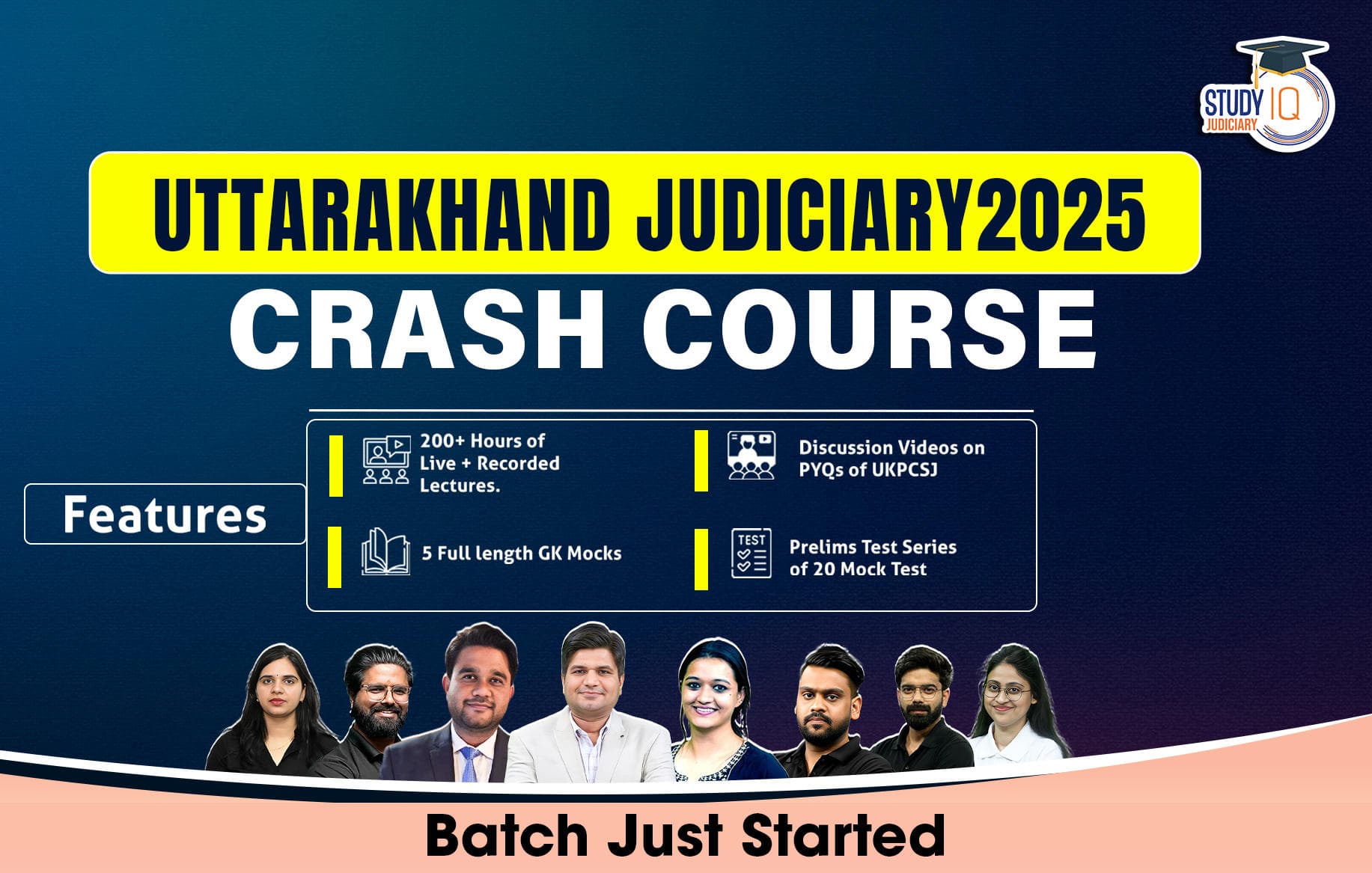Table of Contents
In September 2025, the Supreme Court of India issued an interim order staying certain portions of the Waqf (Amendment) Act, 2025, but refusing to suspend the entire legislation. A court headed by Chief Justice B.R. Gavai and Justice Augustine George Masih underlined that its observations are prima facie, leaving the constitutional legitimacy of the bill subject to final adjudication. The petitions, submitted by Members of Parliament and religious organisations, contend that the revisions infringe upon the community’s freedom to govern its own religious matters as stipulated in Articles 25 and 26 of the Constitution.
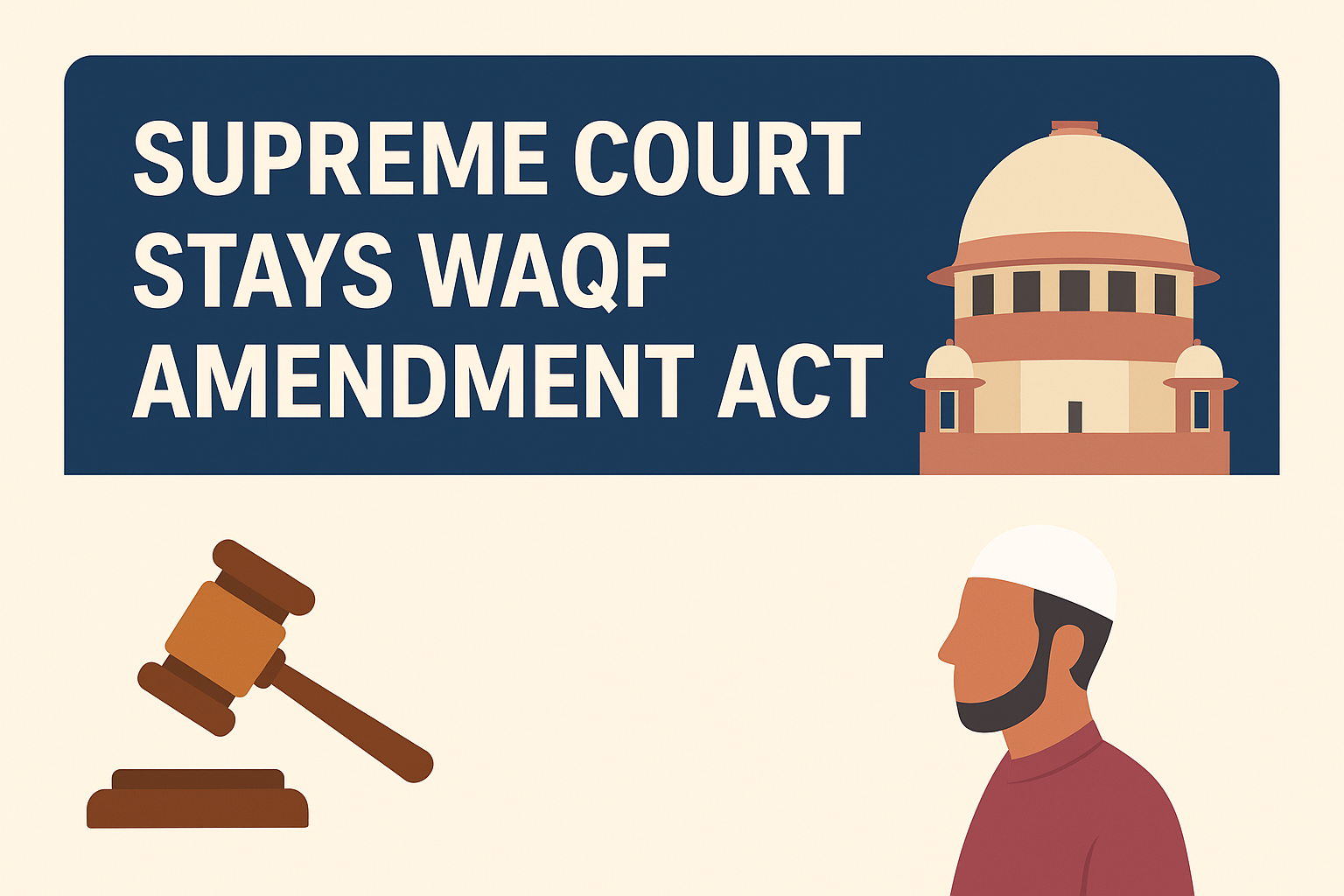
Principal Directives of the Supreme Court
Provisions Stayed
- Five-Year Requirement for Muslim Practice (Section 3(r)): Stipulated that only a practising Muslim with a minimum of five years’ experience could designate property as waqf.
- Stayed because of the lack of regulations or mechanisms to authenticate religious practices, hence endangering arbitrary power.
- Collector’s Report Prior to Waqf Recognition (Proviso to Section 3C): A Collector’s inquiry for encroachment is necessary before the registration of a waqf.
- Stayed in effect as it infringed upon the separation of powers by assigning adjudicatory tasks to executive officials.
- Interim Protection for User-Designated Waqf: Although the deletion of “waqf-by-user” was not stayed, existing waqfs-by-user were safeguarded from modifications in revenue records until waqf tribunals and High Courts adjudicated on the disputes.
Provisions Not Stayed
- Compulsory Registration of Waqf Properties – Determined to be an extension of the previous legal framework.
- Inclusion of Non-Muslims in Waqf Bodies is permitted, limited to 4 out of 22 in the Central Waqf Council and 3 out of 11 in State Boards.
- Section 23- The appointment of ex officio members is upheld, with the stipulation that the CEO should be a Muslim “as far as possible.”
- Section 104 (Waqf by Non-Muslims) has been annulled; nonetheless, non-Muslims retain the ability to allocate property via trusts.
- Sections 3D and 3E – The revocation of waqf status for ASI monuments and the prohibition of declaring tribal lands as waqf have not been stayed.
Waqf in India: Historical and Constitutional Framework
- Waqf is a perpetual allocation of property for religious or charitable objectives in accordance with Islamic law.
- The Waqf Act of 1995 established governance structures by forming Waqf Boards and the Central Waqf Council.
- The 2025 Amendment aimed to rectify misuse and encroachments while promoting transparency; nonetheless, many contend it violates religious freedom.
Constitutional Connections
- Article 25(1): The freedom of conscience and the right to freely profess, practice, and propagate religion.
- Article 26(b): The right of each religious sect to govern its own religious affairs.
- Article 14: Equality before the law, applied to contest the unfair targeting of Muslim endowments.
- Article 300A: Right to property – pertinent for claims of dispossession.
Judicial Precedents Regarding Waqf and Religious Autonomy
- Board of Muslim Wakfs v. Radha Kishan (1979)– Determined that civil courts possess jurisdiction over waqf disputes unless expressly prohibited.
- Sayyed Ali v. Andhra Pradesh Wakf Board (1998) reiterated that waqf constitutes a perpetual dedication and is irrevocable.
- P. Wakf Board v. Subhan Shah (2006)– Highlighted the safeguarding of waqf properties from encroachment.
- Ismail Faruqui v. Union of India (1994)- Differentiated between essential and non-essential religious practices, pertinent for constitutional examination of amendments.
Global Comparative Perspectives on Waqf Regulation in the Middle East
- In Egypt, Waqf properties are regulated by the Ministry of Awqaf, under stringent state oversight since the nationalisation of the 1950s.
- Turkey: Post-Ottoman reforms centralised waqf under governmental management to mitigate exploitation of religious endowments.
Southern Asia
- The Waqf Properties Ordinance of 1979 in Pakistan confers governmental authority over waqf for administrative and developmental objectives.
- The Waqf Administration Act of Bangladesh governs endowments, harmonising community independence with governmental oversight.
Context of the West
- In the United Kingdom and the USA, Muslim endowments are often organised as charity trusts governed by secular law, with limited governmental intervention in religious administration.
Evaluation of the Interim Order
- The Court achieved equilibrium between governmental regulation and community autonomy.
- Provisions that jeopardised arbitrary authority (five-year practice examination, Collector’s jurisdiction) were stayed.
- Implemented procedures to guarantee transparency, including registration, involvement of non-Muslims, restrictions on tribal property, and regulations concerning ASI monuments.
- Interim protection for waqf-by-user underscores judicial awareness of historical practices, while postponing final resolution to waqf tribunals and High Courts.
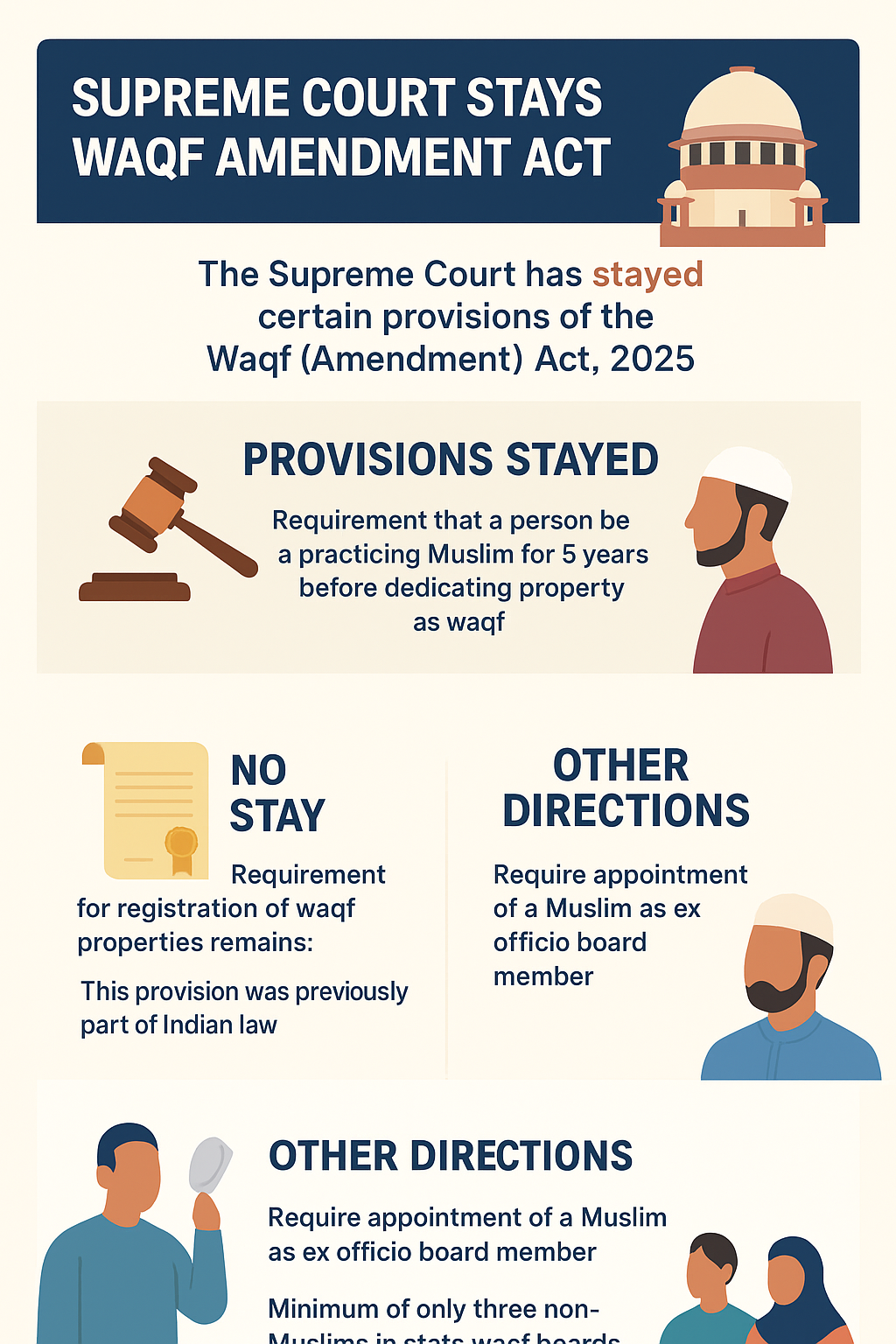
Consequences and Future Directions
- For the Community: Limited relief through the safeguarding of waqfs by users and constraints on non-Muslim involvement.
- For the State: The State possesses the authority to persist with measures designed to mitigate misuse and invasion.
- For the Constitution: The Constitution raises questions about the equilibrium between Articles 25-26 and state interests as outlined in Article 25(2), particularly concerning social welfare and reform.
- For Future Litigation: In future litigation, the judge’s final decision is expected to elucidate whether governmental involvement in waqf regulation contravenes the idea of “essential religious practice.”
Conclusion
- The Supreme Court’s interim order on the Waqf (Amendment) Act, 2025, highlights the judiciary’s function as a constitutional mediator reconciling freedom of religion, property rights, and governmental interests.
- By retaining specific rules while permitting others, the Court circumvented blanket invalidation, thereby guaranteeing temporary protection for waqf properties and religious rituals.
- The outcome will ascertain the extent to which the state can regulate religious endowments within a secular, pluralistic constitutional framework.
- India’s approach represents a moderate stance between robust state control, as observed in Egypt or Turkey, and total autonomy, characteristic of Western trust models.
- The ultimate decision may redefine the parameters of religious autonomy, property rights, and secular governance in India.

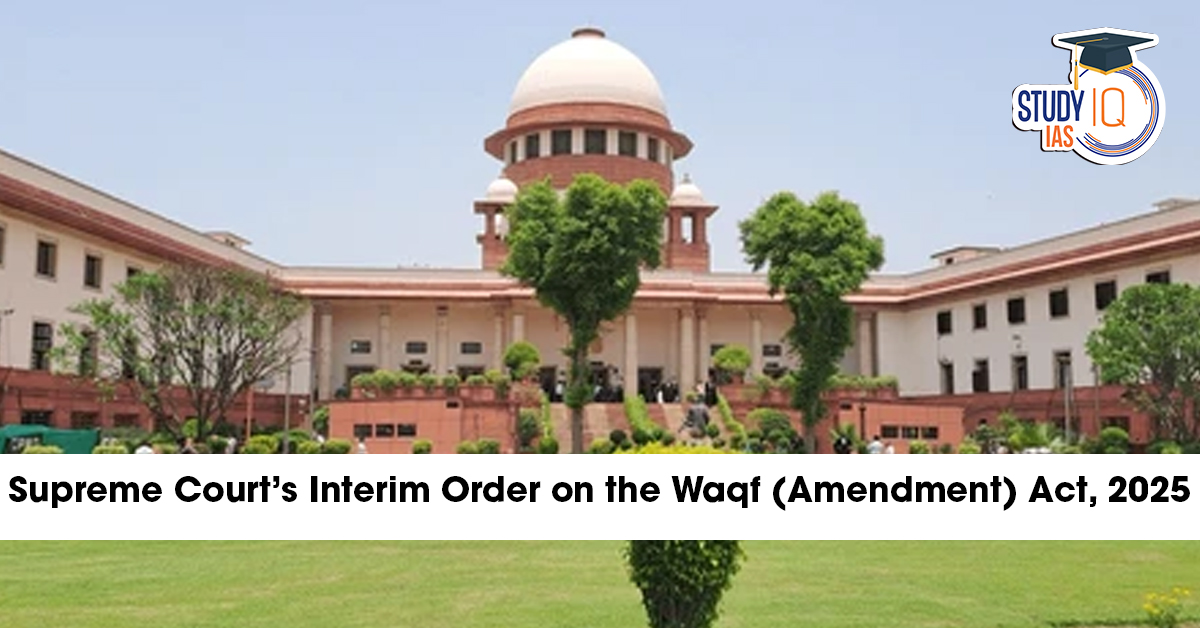
 Warring Couples Cannot Make Courts Their...
Warring Couples Cannot Make Courts Their...
 Tackling Child Trafficking in India: Leg...
Tackling Child Trafficking in India: Leg...
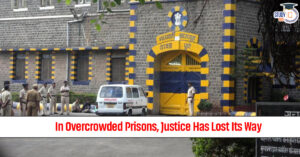 In Overcrowded Prisons, Justice Has Lost...
In Overcrowded Prisons, Justice Has Lost...






